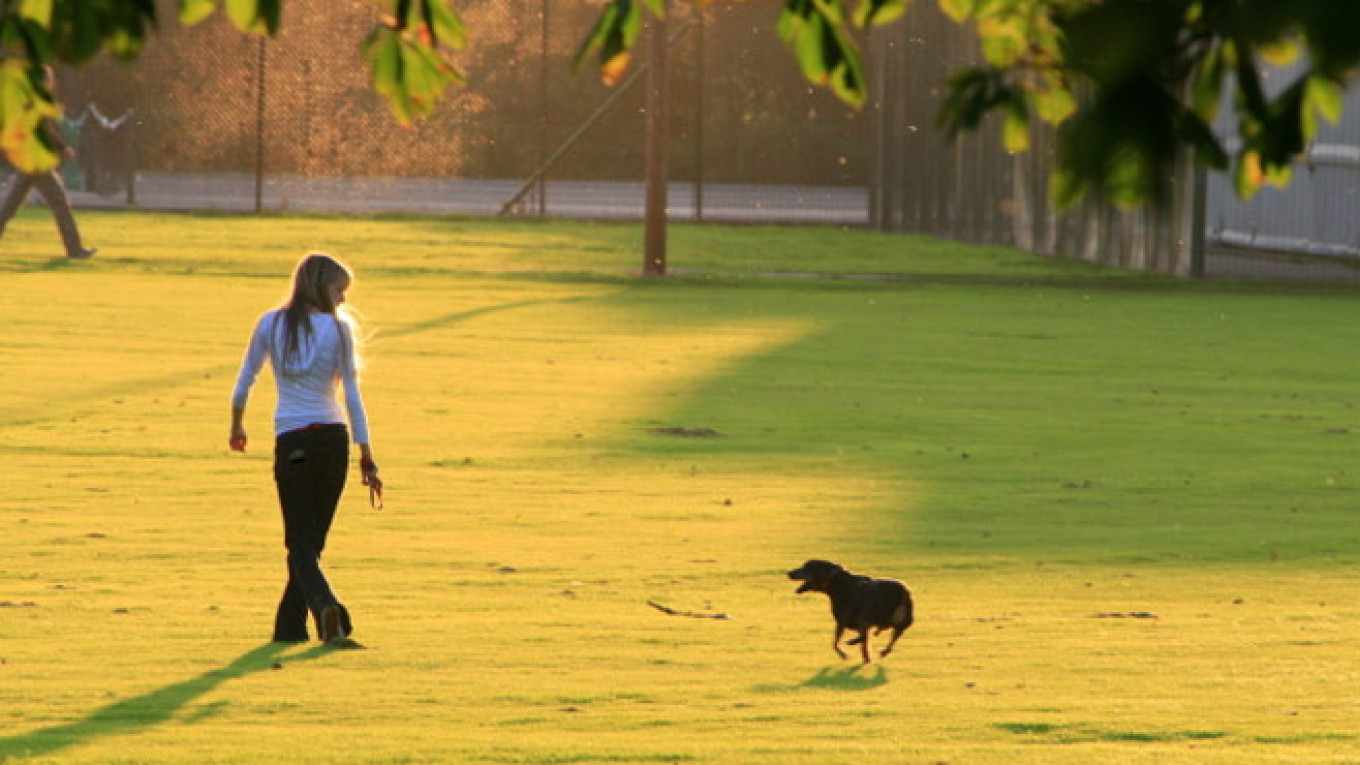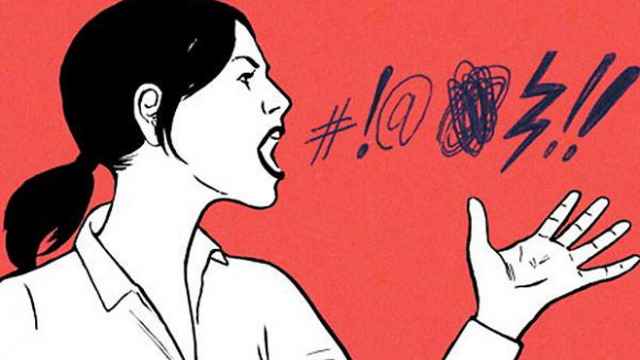Вы́гул соба́к: dog walking
If there is one thing I love about the Russian language, it's word formation — that magical process whereby you take a root word, add a prefix, and suddenly you aren't talking about doing the laundry (стирать), you're talking about getting a stain out (отстирывать).
One basic verb that is particularly rich in spin-offs is гулять (to stroll). Actually, the basic verb itself is pretty rich in meaning. First of all, it just means to walk around for pleasure: Каждый день после обеда мы с мужем гуляем в парке. (Every day after lunch my husband and I take a walk in the park.) Or it can mean to dash around. Eyes can do this: Его взгляд гулял по комнате. (His glance darted around the room.) And so can steering wheels: Руль при езде гуляет туда-сюда. (When I'm driving, the steering wheel jerks back and forth.)
And it can also mean to party: Соседи гуляли до утра. (Our neighbors partied until dawn.) Or to enjoy a private party, often with the word налево (on the left): Почему мужья начинают гулять налево? (Why do husbands start cheating?)
The prefix от- can indicate doing something completely, so отгулять can mean having your share of pleasure. Он весело отгулял своё время. (He had a lot of fun in his life.) But the prefix от- also has the sense of "out." You'll hear отгулять in the workplace — or rather, out of the workplace. Отгулять отпуск is to take a vacation. And отгул is a comp day. Поскольку мне пришлось работать в субботу, я брала отгул. (Since I had to work on Saturday, I took a comp day.)
Вы- is a prefix that can mean doing something to completion or using something up. Выгулять sometimes means "to do your quota of walking." Я утром выгулял час. (This morning I did my hour walk.) But most of the time it's used to mean taking your dog/pig/goat/cat/ferret for a walk. Утром и вечером в любую погоду я выгуливаю собаку. (I walk my dog morning and night in any weather.) This produces the noun выгул (a walk), which you may see on signs: Выгул собак строго запрещён. (No dogs allowed.) This is actually a euphemism for "Don't you dare let your dog do his business here."
Things get wilder with the prefix раз-. Разгулять isn't used that often, but you might find it in the context of dispersing something, like разгулять тоску (chase away the blues). Most of the time you hear it as a noun — разгул (riot, debauchery). Sometimes vices go wild, like разгул коррупции (rampant corruption). More often people go wild: Бывший муж пустился в разгул после развода. (My ex really helled around after the divorce.) You can also use the verb разгуляться to describe whooping it up: Разгулялись на свадьбе! (We really kicked back at the wedding!)
Alas, разгуляться can lead to догуляться, which means to get yourself into trouble or difficulties because of too much carousing or cutting loose. This is an all-purpose verb. You look at the chaos your kids left after playing: Догулялись! (What a mess!) You look at your significant other with a killer hangover: Догулялся! (That's what you get!) Or you look carefully at your teenage daughter and realize she's pregnant: Догулялась! (Look what you got yourself into!)
To which they all might answer: Гулять так гулять! (If you're going to have fun, really have fun!)
Michele A. Berdy, a Moscow-based translator and interpreter, is author of "The Russian Word's Worth" (Glas), a collection of her columns.
A Message from The Moscow Times:
Dear readers,
We are facing unprecedented challenges. Russia's Prosecutor General's Office has designated The Moscow Times as an "undesirable" organization, criminalizing our work and putting our staff at risk of prosecution. This follows our earlier unjust labeling as a "foreign agent."
These actions are direct attempts to silence independent journalism in Russia. The authorities claim our work "discredits the decisions of the Russian leadership." We see things differently: we strive to provide accurate, unbiased reporting on Russia.
We, the journalists of The Moscow Times, refuse to be silenced. But to continue our work, we need your help.
Your support, no matter how small, makes a world of difference. If you can, please support us monthly starting from just $2. It's quick to set up, and every contribution makes a significant impact.
By supporting The Moscow Times, you're defending open, independent journalism in the face of repression. Thank you for standing with us.
Remind me later.








